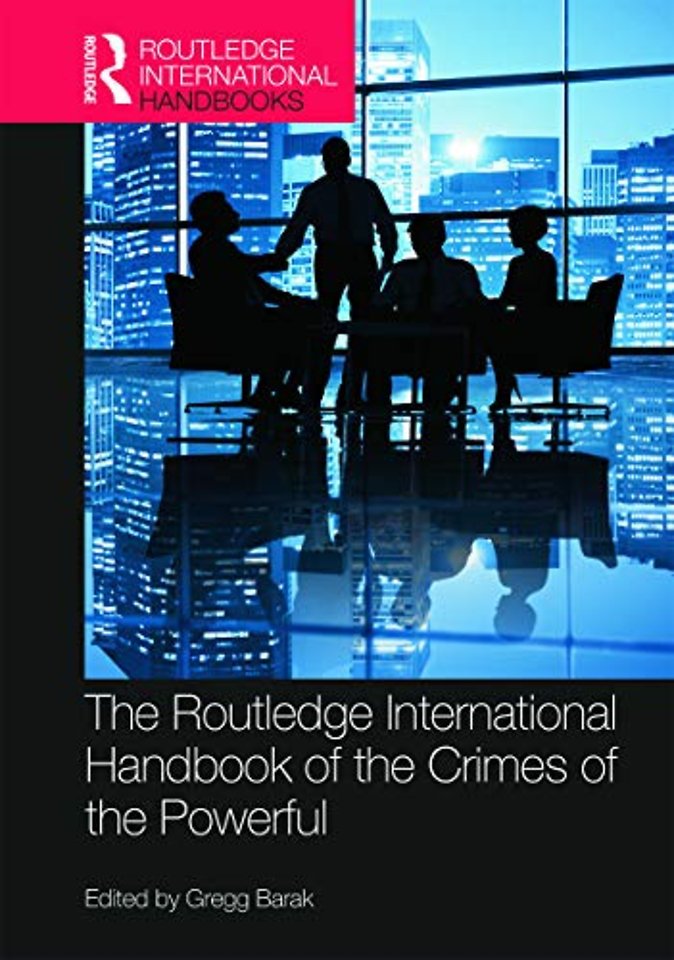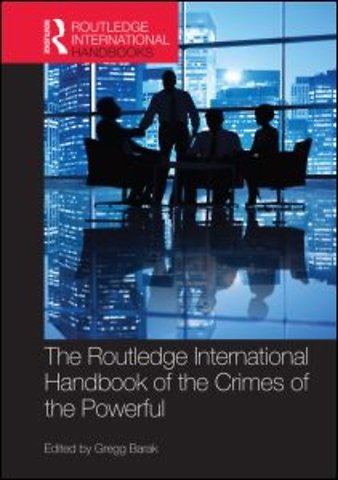The Routledge International Handbook of the Crimes of the Powerful
Gebonden Engels 2015 1e druk 9780415741262Samenvatting
Across the world, most people are well aware of ordinary criminal harms to person and property. Often committed by the powerless and poor, these individualized crimes are catalogued in the statistics collected annually by the FBI and by similar agencies in other developed nations. In contrast, the more harmful and systemic forms of injury to person and property committed by powerful and wealthy individuals, groups, and national states are neither calculated by governmental agencies nor annually reported by the mass media. As a result, most citizens of the world are unaware of the routinized "crimes of the powerful", even though they are more likely to experience harms and injuries from these types of organized offenses than they are from the atomized offenses of the powerless.
Research on the crimes of the powerful brings together several areas of criminological focus, involving organizational and institutional networks of powerful people that commit crimes against workers, marketplaces, taxpayers and political systems, as well as acts of torture, terrorism, and genocide. This international handbook offers a comprehensive, authoritative and structural synthesis of these interrelated topics of criminological concern. It also explains why the crimes of the powerful are so difficult to control.
Edited by internationally acclaimed criminologist Gregg Barak, this book reflects the state of the art of scholarly research, covering all the key areas including corporate, global, environmental, and state crimes. The handbook is a perfect resource for students and researchers engaged with explaining and controlling the crimes of the powerful, domestically and internationally.
Specificaties
Lezersrecensies
Inhoudsopgave
Part I: Culture, ideology and the crimes of the powerful
1. Crimes of the powerful and the definition of crime, David Friedrichs
2. Operationalizing "organizational violence", Gary S. Green and Huisheng Shou
3. Justifying the crimes of the powerful, Vincenzo Ruggiero
4. Corporate criminals constructing white collar crime—or why there is no corporate crime on USA Network’s White Collar series, Carrie L. Buist and Paul Leighton
Part II: Crimes of globalization
5. Capital and catharsis in the Nigerian petroleum extraction industry: lessons on the crimes of globalization, Ifeanyi Ezeonu
6. State and corporate drivers of global dysnomie: horrendous crimes and the law, Anamika Twyman- Ghoshal and Nikos Passas
7. Truth, justice and the Walmart way: consequences of a retailing behemoth, Lloyd Klein and Steve Lang
8. Human trafficking: examining global responses, Marie Segrave and Sanja Milivojevic
9. Globalization, sovereignty and crime: a philosophical processing, Kingsley Ejiogu
Part III: Corporate crimes
10. Corporate crimes and the problems of enforcement, Ronald Burns
11. Corporate-financial crime scandals: a comparative analysis of the collapses of Insull and Enron, Brandon Sullivan
12. Corporate social responsibility, corporate surveillance and neutralizing corporate resistance: on the commodification of risk-based policing, Hans Krause Hansen and Julie Uldam
13. Walmart’s sustainability initiative: greening capitalism as a form of corporate irresponsibility, Steve Lang and Lloyd Klein
Part IV: Environmental crimes
14. Climate change, ecocide and the crimes of the powerful, Rob White
15. Privatization, pollution and power: a green criminological analysis of present and future global water crises, Bill McClanahan, Avi Brisman, and Nigel South
16. Unfettered fracking: a critical examination of hydraulic fracturing in the United States, Jacquelynn Doyon and Elizabeth Bradshaw
17. The international impact of electronic waste: a case study of Western Africa, Jacquelynn Doyon
Part V: Financial crimes
18. Bad banks: recurrent criminogenic conditions in the U.S. commercial banking industry, Robert Tillman
19. Financial misrepresentation and fraudulent manipulation: SEC settlements with Wall Street firms in the wake of the economic meltdown, David Shichor
20. A comprehensive framework for conceptualizing financial frauds and victimization, Mary Dodge and Skylar Steele
Part VI: State crimes
21. Transnational institutional torturers: state crime, ideology and the role of France’s savior-faire in Argentina’s dirty war, 1976-1983, Melanie Collard
22. Para-state crime and plural legalities in Colombia, Thomas MacManus and Tony Ward
23. Australian border policing and the production of state harm, Mike Grewcock
24. Gendered forms of state crime: the case of state perpetrated violence against women, Victoria Collins
Part VII: State-corporate crimes
25. Blacking out the Gulf: state-corporate environmental crime and the response to the BP oil spill, Elizabeth Bradshaw
26. Collaborate state and corporate crime: fraud, unions and elite power in Mexico, Maya Barak
27. Mining as state-corporate crime: the case of AngloGold Ashanti in Colombia, Damián Zaitch and Laura Gutiérrez-Gómez
Part VIII: State-routinized crimes
28. Organized crimes in a transitional economy: the resurgence of the criminal underworld in contemporary China, Peng Wang
29. Institutionalized abuse of police power: how public policing condones and legitimates police corruption in North America, Marilyn Corsianos
30. The appearances and realities of corruption in Greece: the cases of MAYO and Siemens AG, Effi Lambropoulou
Part IX: Failing to control the crimes of the powerful
31. Postconviction and powerful offenders: the white collar offender as professional ex, Ben Hunter and Stephen Farrall
32. Business ethics as a means of controlling abusive corporate behavior, Jay Kennedy
33. Ag-gag laws and farming crimes against animals, Doris Lin
34. Genocide and controlling the crimes of the powerful, Augustine Brannigan
35. Controlling state crime and alternative reactions, Jeffrey Ian Ross
36. Hacking the state: hackers, technology, control, resistance, and the state, Kevin F. Steinmetz and Jurg Gerber
37. (Liberal) democracy means surveillance: on security, control and the surveillance techno-fetish, Dawn Rothe and Travis Linnemann
38. Limiting financial capital and regulatory control as non-penal alternatives to Wall Street looting and high-risk securities, Gregg Barak.
Anderen die dit boek kochten, kochten ook
Rubrieken
- advisering
- algemeen management
- coaching en trainen
- communicatie en media
- economie
- financieel management
- inkoop en logistiek
- internet en social media
- it-management / ict
- juridisch
- leiderschap
- marketing
- mens en maatschappij
- non-profit
- ondernemen
- organisatiekunde
- personal finance
- personeelsmanagement
- persoonlijke effectiviteit
- projectmanagement
- psychologie
- reclame en verkoop
- strategisch management
- verandermanagement
- werk en loopbaan







